(完整版)八年级上英语知识点总结(已整理)
八年级上册英语知识点总结(汇总8篇)
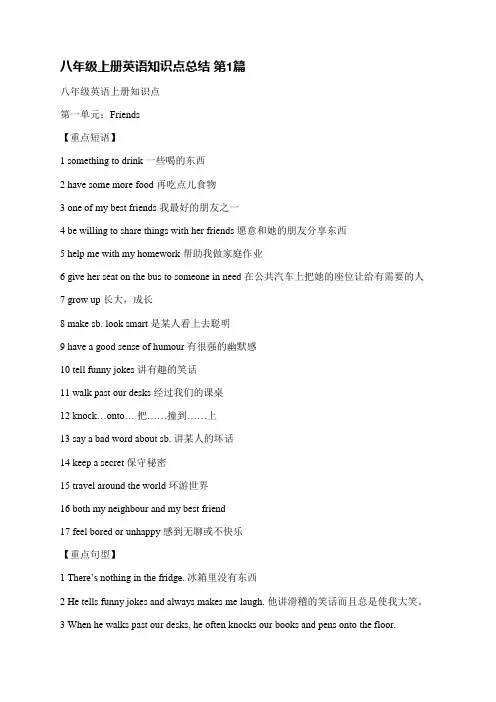
八年级上册英语知识点总结第1篇八年级英语上册知识点第一单元:Friends【重点短语】1 something to drink 一些喝的东西2 have some more food 再吃点儿食物3 one of my best friends 我最好的朋友之一4 be willing to share things with her friends 愿意和她的朋友分享东西5 help me with my homework 帮助我做家庭作业6 give her seat on the bus to someone in need 在公共汽车上把她的座位让给有需要的人7 grow up 长大,成长8 make sb. look smart 是某人看上去聪明9 have a good sense of humour 有很强的幽默感10 tell funny jokes 讲有趣的笑话11 walk past our desks 经过我们的课桌12 knock…onto… 把……撞到……上13 say a bad word about sb. 讲某人的坏话14 keep a secret 保守秘密15 travel around the world 环游世界16 both my neighbour and my best friend17 feel bored or unhappy 感到无聊或不快乐【重点句型】1 There’s nothing in the fridge. 冰箱里没有东西2 He tells funny jokes and always makes me laugh. 他讲滑稽的笑话而且总是使我大笑。
3 When he walks past our desks, he often knocks our books and pens onto the floor.当他经过我们的课桌时,常把我们的书和钢笔撞到地上。
八年级上册英语知识点归纳总结道客巴巴
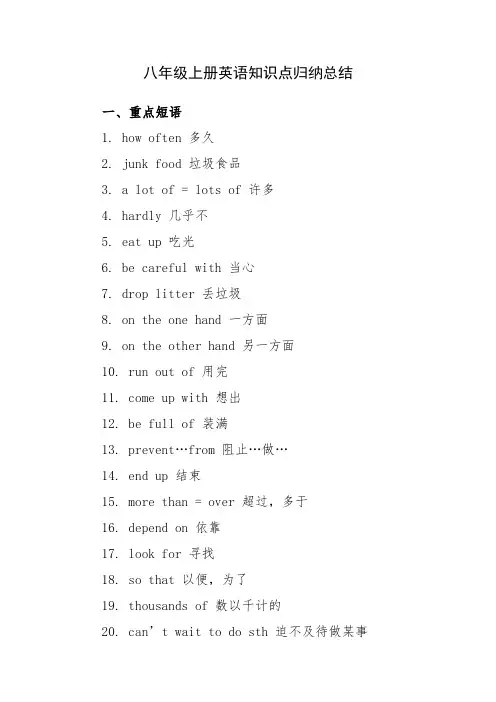
八年级上册英语知识点归纳总结一、重点短语1. how often 多久2. junk food 垃圾食品3. a lot of = lots of 许多4. hardly 几乎不5. eat up 吃光6. be careful with 当心7. drop litter 丢垃圾8. on the one hand 一方面9. on the other hand 另一方面10. run out of 用完11. come up with 想出12. be full of 装满13. prevent…from 阻止…做…14. end up 结束15. more than = over 超过,多于16. depend on 依靠17. look for 寻找18. so that 以便,为了19. thousands of 数以千计的20. can’t wait to do sth 迫不及待做某事21. around the world 在全世界22. in different ways 以不同的方式23. as we know 正如我们所知24. make a difference 有所作为25. become successful 取得成功26. seem impossible 似乎不可能27. give up easily 轻易放弃二、重点句型1. It’s +形容词+ to do sth. 干某事是……的。
2. It takes sb some time to do sth. 花某人多长时间干某事。
3. How do you keep healthy?你怎么保持健康?4. Here’s an idea!我有个主意!5. I really enjoy the time when I’m with you. 我真的很喜欢和你在一起的时光。
6. is it possible to do sth?干某事可能吗?7. It’s important to do sth. 干某事是重要的。
(完整版)八年级上册英语各单元知识点
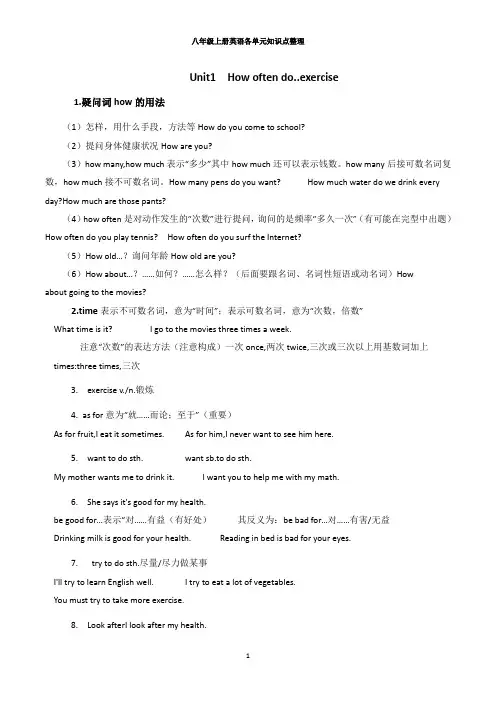
Unit1 How often do..exercise1.疑问词how的用法(1)怎样,用什么手段,方法等How do you come to school?(2)提问身体健康状况How are you?(3)how many,how much表示“多少”其中how much还可以表示钱数。
how many后接可数名词复数,how much接不可数名词。
How many pens do you want? How much water do we drink every day? H ow much are those pants?(4)how often是对动作发生的“次数”进行提问,询问的是频率“多久一次”(有可能在完型中出题)How often do you play tennis? How often do you surf the Internet?(5)How old…?询问年龄How old are you?(6)How about…?……如何?……怎么样?(后面要跟名词、名词性短语或动名词)Howabout going to the movies?2.time表示不可数名词,意为“时间”;表示可数名词,意为“次数,倍数”What time is it? I go to the movies three times a week.注意“次数”的表达方法(注意构成)一次once,两次twice,三次或三次以上用基数词加上times:three times,三次3. exercise v./n.锻炼4. as for意为“就……而论;至于”(重要)As for fruit,I eat it sometimes. As for him,I never want to see him here.5. want to do sth. want sb.to do sth.My mother wants me to drink it. I want you to help me with my math.6. She says it's good for my health.be good for…表示“对……有益(有好处)其反义为:be bad for…对……有害/无益Drinking milk is good for your health. Reading in bed is bad for your eyes.7. try to do sth.尽量/尽力做某事I'll try to learn English well. I try to eat a lot of vegetables.You must try to take more exercise.8. Look afterI look after my health.My brother is ill. I have to look after him today.He often helps his mother look after his little sister.9. help sb.(to)do sth.帮助某人做某事(to大多都是省略)My healthy lifestyle helps me get good grades. She often helps me learn math.10. the same as…与……一样Is her lifestyle the same as yours or different?She looks the same as her sister.11. I think I'm kind of unhealthy.kind of=a little有点儿(重要短语);a kind of一种12. although=thoughAlthough he's ill,he goes to school on time.13. keep in good health(重点掌握)=keep healthy=stay healthykeep+形容词表示保持某种状态A lot of vegetables help you to keep in good health.Keep quiet!The baby is sleeping. We must keep our classroom clean14. That sounds interesting.look(看起来),sound(听起来),smell(闻起来),taste(尝起来),feel(觉得),seem(好象),grow(变得),get(变得)等词在英语中可用作系动词,后跟形容词作表语。
人教版八年级英语上册知识点总结(最新最全)
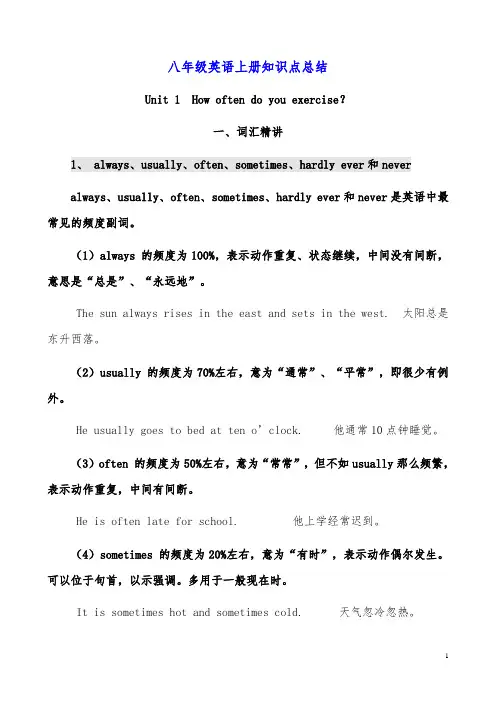
八年级英语上册知识点总结Unit 1 How often do you exercise?一、词汇精讲1、 always、usually、often、sometimes、hardly ever和neveralways、usually、often、sometimes、hardly ever和never是英语中最常见的频度副词。
(1)always 的频度为100%,表示动作重复、状态继续,中间没有间断,意思是“总是”、“永远地”。
The sun always rises in the east and sets in the west. 太阳总是东升西落。
(2)usually 的频度为70%左右,意为“通常”、“平常”,即很少有例外。
He usually goes to bed at ten o’clock. 他通常10点钟睡觉。
(3)often 的频度为50%左右,意为“常常”,但不如usually那么频繁,表示动作重复,中间有间断。
He is often late for school. 他上学经常迟到。
(4)sometimes 的频度为20%左右,意为“有时”,表示动作偶尔发生。
可以位于句首,以示强调。
多用于一般现在时。
It is sometimes hot and sometimes cold. 天气忽冷忽热。
Sometimes he does it this way and sometimes he does it that way.他有时这样做,有时那样做。
(5)hardly ever 的频度为5%左右,意为“几乎不”、“偶尔”,表频率,位置是“行前be后”。
I hardly ever go out these days. 这些天我几乎不出门。
(6)never 的频度为0,意为“从来不”、“永不”。
My parents are never late for work. 我父母上班从来不迟到。
八年级上册英语知识点总结 (最新最全)
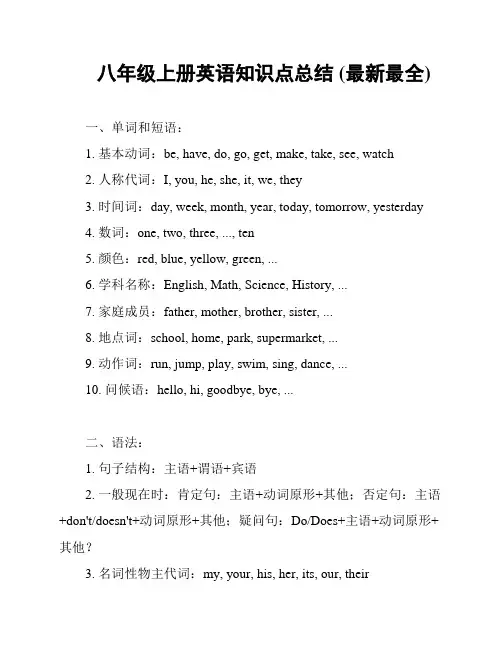
八年级上册英语知识点总结 (最新最全)一、单词和短语:1. 基本动词:be, have, do, go, get, make, take, see, watch2. 人称代词:I, you, he, she, it, we, they3. 时间词:day, week, month, year, today, tomorrow, yesterday4. 数词:one, two, three, ..., ten5. 颜色:red, blue, yellow, green, ...6. 学科名称:English, Math, Science, History, ...7. 家庭成员:father, mother, brother, sister, ...8. 地点词:school, home, park, supermarket, ...9. 动作词:run, jump, play, swim, sing, dance, ...10. 问候语:hello, hi, goodbye, bye, ...二、语法:1. 句子结构:主语+谓语+宾语2. 一般现在时:肯定句:主语+动词原形+其他;否定句:主语+don't/doesn't+动词原形+其他;疑问句:Do/Does+主语+动词原形+其他?3. 名词性物主代词:my, your, his, her, its, our, their4. 形容词比较级:形容词+er+than5. 介词短语:in, on, at, to, from, with, without三、句型:1. 询问信息:What's your name? How old are you? Where do you live? What's your favorite color? ...2. 表示喜欢和讨厌:I like swimming. He loves playing video games. She hates broccoli. They enjoy watching movies.3. 描述外貌和性格:She has long black hair. He is tall and thin. They are friendly and kind.4. 谈论家庭和学校:My father is a teacher. Our school has a big library. His sister is in the same class.5. 讲述日常活动:I get up at 7 o'clock. They go to school by bus. We have lunch at 12 o'clock.四、常见对话:1. 自我介绍:Person A: Hello, my name is David. What's your name?Person B: Hi David, I'm Lily.2. 询问及回答年龄:Person A: How old are you?Person B: I'm twelve years old.3. 询问及回答居住地:Person A: Where do you live?Person B: I live in Beijing.4. 询问及回答喜欢的颜色:Person A: What's your favorite color?Person B: My favorite color is blue.五、其他信息:1. 八年级上册英语课程涵盖了日常生活、学校、家庭、运动、爱好和兴趣等方面的内容。
(完整版)八年级上册第一单元英语语法、短语和知识点总结
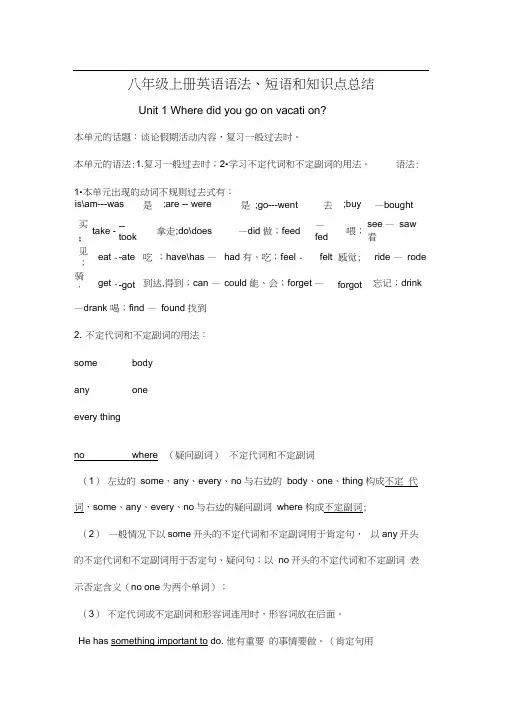
八年级上册英语语法、短语和知识点总结Unit 1 Where did you go on vacati on?本单元的话题:谈论假期活动内容,复习一般过去时。
本单元的语法:1.复习一般过去时;2•学习不定代词和不定副词的用法。
语法: 1•本单元出现的动词不规则过去式有:is\am---was 是;are -- were 是;go---went 去;buy —bought买;take ---took拿走;do\does —did 做;feed—fed喂;see —saw看见;eat --ate 吃;have\has —had 有、吃;feel -felt 感觉;ride —rode 骑;get --got 到达,得到;can — could 能、会;forget —forgot 忘记;drink —drank 喝;find —found 找到2. 不定代词和不定副词的用法:some bodyany oneevery thingno where (疑问副词)不定代词和不定副词(1)左边的some、any、every、no 与右边的body、one、thing 构成不定代词,some、any、every、no与右边的疑问副词where 构成不定副词;(2)—般情况下以some开头的不定代词和不定副词用于肯定句,以any开头的不定代词和不定副词用于否定句、疑问句;以no开头的不定代词和不定副词表示否定含义(no one为两个单词);(3)不定代词或不定副词和形容词连用时,形容词放在后面。
He has something important to do. 他有重要的事情要做。
(肯定句用something,形容词important 放后)Did you buy anything special?(一般疑问句用anything,形容词special放后)Did you go any where interesting last mon th? 上个月你去令人感兴趣的地方了吗?(一般疑问句用不定副词anywhere,形容词interesting 放后)(4)不定代词和不定副词做主语时,后面的动词用单数形式。
(完整版)人教版八年级英语上册各单元知识点归纳和作文范文
新课标八年级上册英语单元知识点归纳Unit1 Where did you go on vacation?短语归纳1.go on vacation去度假2.stay at home待在家里3.go to the mountains去爬山4.go to the beach去海滩5.visit museums 参观博物馆6.go to summer camp去参加夏令营7.quite a few相当多8.study for tests为测验而学习9.go out出去10.most of the time大部分时间11.have a good time doing=have fun doing =enjoy oneself玩得高兴12.of course=sure =certainly当然13.feel like给……的感觉;感受到14.go shopping去购物15.in the past在过去16.walk around四处走走17.because of+名词短语:因为because+句子18. a/one bowl of…一碗……19. the next day第二天20.drink tea喝茶21.find out找出;查明22.go on继续23.take photos照相24.something important重要的事25.up and down上上下下e up出来come out 出版发行27.go out with anyone 跟别人出去28.say about 发表对…看法29.rain hard 雨下得大30.too much+不可数名词太多too many+可数名词复数太多much too+形容词太用法:1.buy sth. for sb. / buy sb. sth.为某人买某物2.taste / look/sound/smell good. 尝起来/看起来/听起来/闻起来不错3.nothing…but+动词原形除了……之外什么都没有4.seem+(to be)+ adj. 看起来……5.arrive in+大地点/ arrive at+小地点/get to +地点/reach +地点到达某地6.decide to do sth.决定去做某事7.try doing sth.尝试做某事/ try to do sth.尽力去做某事8.forget doing sth.忘记做过某事/ forget to do sth.忘记做某事9.enjoy doing sth.喜欢做某事10. want to do sth.想去做某事11.start doing sth.开始做某事12.stop doing sth. 停止做某事13.dislike doing sth. 不喜欢做某事14.keep doing sth.继续做某事keep on doing sth 不停做某事15.Why not do. sth.=why don’t you do sth为什么不做……呢?16.so+adj.+that+从句如此……以至于……17.tell sb. (not) to do sth. 告诉某人(不要)做某事18.enough +名词,形容词+enough19.not really .真的没有。
(全)人教八年级英语上全册考点,知识点梳理
人教八年级英语上全册考点,知识点梳理(含语法+作文范文)U1一、重点单词1. nothing pron没有什么,常考单词拼写,eat nothing2. yourself pron你自己,易考复数,yourselves,look after yourselves,照顾你们自己3. diary n日记keep a diary/ keep diaries4. activity n活动many outdoor activities5. decide v决定单词拼写中易考其过去式decided6. building n建筑物,易考复数buildings7. difference n差别,不同,常考查名词复数differences或者变为形容词different8. umbrella n雨伞take an umbrella9. enough adj/adv 足够的,enough+名词, 形容词+enough10. hungry adj 饥饿的常考语境I’m____, let’s go to the restaurant.二、重点短语1. go on vacation 去度假2. stay at home 待在家里3. go to the mountains 去山区4. quite a few 相当多;不少5. study for…为……而学习6. most of the time 大部分时间7. of course 当然8. keep a diary 记日记9. go shopping 去购物10. in the past 在过去11. too many 太多12. because of 因为13. the next day 第二天14. find out 找出;查明15. feel like 给…的感觉;感受到三、语法1. 不定代词(1)不定代词+adj./adv. (注意:肯定句、疑问句、委婉的疑问句)(2)不定代词作主语,谓语动词用单数(一般现在时,尤其是有介词短语插入的时候,要学会辨别主语和谓语)2. a little/little 修饰不可数名词;a few /few 修饰可数名词。
(完整版)仁爱版英语八年级上知识点归纳
Topic 1 What’s your favorite sport?重点词语:1. almost(反义词)never2.win(过去式)won(名词)winner?3.ski(现在分词)skiing4.famous(比较级)more famous5.arrive(同义词)reach6.leave(过去式))left?7.popular(最高级)most popular 8.healthy(同义词)fit(名词)health (1)?词组1.?during the summer holidays?? 在暑假期间2.?between…and… 在两者之间3.?cheer sb. on 为某人加油4.?prefer doing sth. 更喜欢做某事5.?quite a bit/a lot 很多6.?plan to do sth. 计划做某事7.?have a skating club 举办滑雪俱乐部去滑雪、滑冰、骑车、爬山、远足9.?arrive in 到达10.?play against… 与……对抗/较量11.?for long 很久12.?leave for… 动身去…后天就是The Day After Tomorrow.14.?places of interest 名15.?胜打棒球17.?at least 至少善于做某事,即be good at参加全世界21.?be good for 对……有益22.?a good way 一种好方法Keep fit or maintain health.24.?relax oneself 放松某人自己重点句型你最喜爱的运动是什么?26.?Which sport do you prefer? = Which sport do you like better? 你更喜欢什么运动?I prefer skating. = I like skating better. 我更喜欢滑雪.你常滑雪吗?或Do you often skate?28.?She spends at least half an hour in the gym every day. 每天她至少花半小时在体育馆.29.?She plays baseball pretty well and she is also good at jumping.她棒球打得相当好而且擅长于跳.30.?What kind of sports do you like? = Which sport do you like? 你喜欢哪种运动? 重点语言点31.?see sb. do sth? “看见某人做了某事” 强调动作的全过程,常与every day; often 等连用.see sb. doing sth.? “看见某人正在做某事” 强调动作正在进行.I saw you play basketball almost every day during summer holidays.I often see him draw pictures near the river. 我常看见她在河边画画.I saw her go across the street.? 我看见她过了马路我看见她正在过马路。
(完整版)新人教版八年级英语上册unit1知识点总结
Unit 1 where did you go on vacation ➢单词复习:任何人Anywhere 精彩的;极好的最多的;大多数的没有什么n.没有。
每人;人人.我自己你自己;你亲自hen pig似乎;好像无聊的;厌烦的;郁闷的Someone Diary 活动;活跃。
决定;选定Paragliding bird bicycle building trader惊奇;想知道;怀疑差异;不同顶部;顶等;等待湿的;雨天的低于;在。
..下面饥饿的;渴望的如同;像.。
一样HillDuck不喜欢;厌恶短语归纳1、go on vacation去度假 ,2、stay at home 呆在家,3、go to the mountains 上山/进山,4、go to the beach到海边去,5、visit museums 参观博物馆,6、go to summer camp 去夏令营,7、quite a few 相当多,8、study for为……学习,9、go out 出去,10、most of the time 大部分时间/绝大多数时间,11、taste good 尝起来味道好,12、have a good time玩的开心,13、of course当然可以,14、feel like(doing sth)感觉像……/想要,15、go shopping购物,16、in the past 在过去,17、walk around绕……走,18、too many 太多(可数名词前面),19、because of 因为,20、one bowl of 一碗……,21、find out 查出来/发现,22、go on继续,23、take photos 照相,24、something important重要的事情,25、up and down上上下下,26、come up出来➢习惯用法、搭配1. buy sth。
for sb.=buy sb. sth。
- 1、下载文档前请自行甄别文档内容的完整性,平台不提供额外的编辑、内容补充、找答案等附加服务。
- 2、"仅部分预览"的文档,不可在线预览部分如存在完整性等问题,可反馈申请退款(可完整预览的文档不适用该条件!)。
- 3、如文档侵犯您的权益,请联系客服反馈,我们会尽快为您处理(人工客服工作时间:9:00-18:30)。
八年级上英语语法点滴1) leave的用法1.“leave+地点”表示“离开某地”。
例如:When did you leave Shanghai?你什么时候离开上海的?2.“leave for+地点”表示“动身去某地,前往某地”。
例如:Next Friday, Alice is leaving for London.下周五,爱丽斯要去伦敦了。
3.“leave+地点+for+地点”表示“离开某地去某地”。
例:Why are you leaving Shanghai for Beijing?你为什么要离开上海去北京?2) 情态动词should“应该”学会使用should作为情态动词用,常常表示意外、惊奇、不能理解等,有“竟会”的意思,例如:How should I know? 我怎么知道?Why should you be so late today? 你今天为什么来得这么晚?should有时表示应当做或发生的事,例如:We should help each other. 我们应当互相帮助。
我们在使用时要注意以下几点:1. 用于表示“应该”或“不应该”的概念。
此时常指长辈教导或责备晚辈。
例如:You should be here with clean hands. 你应该把手洗干净了再来。
2. 用于提出意见劝导别人。
例如:You should go to the doctor if you feel ill. 如果你感觉不舒服,你最好去看医生。
3. 用于表示可能性。
should的这一用法是考试中常常出现的考点之一。
例如:We should arrive by supper time. 我们在晚饭前就能到了。
She should be here any moment. 她随时都可能来。
3) What...? 与Which...?1. what与which 都是疑问代词,都可以指人或事物,但是what仅用来询问职业。
如: What is your father? 你父亲是干什么的?该句相当于:What does your father do?What is your father's job?Which 指代的是特定范围内的某一个人。
如:---Which is Peter? 哪个是皮特?--The boy behind Mary. 玛丽背后的那个男孩。
2. What...? 是泛指,所指的事物没有范围的限制;而Which...? 是特指,所指的事物有范围的限制。
如:What color do you like best? (所有颜色)你最喜爱什么颜色?Which color do you like best, blue, green or yellow? (有特定的范围)你最喜爱哪一种颜色?3. what 与which 后都可以接单、复数名词和不可数名词。
如:Which pictures are from China?哪些图片来自中国?4) 频度副词的位置1.常见的频度副词有以下这些:always(总是,一直)usually(通常)often(常常,经常)sometimes(有时候)never (从不)2.频度副词的位置:a.放在连系动词、助动词或情态动词后面。
如:David is often late for school.大卫上学经常迟到。
b.放在行为动词前。
如:We usually go to school at 7:10 every day.我们每天经常在7:10去上学。
c.有些频度副词可放在句首或句尾,用来表示强调。
如:Sometimes I walk home, sometime I ride a bike.有时我步行回家,有时我骑自行车。
3.never放在句首时,主语、谓语动词要倒装。
如:Never have I been there. 我从未去过那里。
5) every day 与everyday1. every day作状语,译为“每一天”。
如:We go to school at 7:10 every day.我们每天7:10去上学。
I decide to read English every day.我决定每天读英语。
2. everyday 作定语,译为“日常的,每天的”。
She watches everyday English on TV after dinner.她晚饭后在电视上看日常英语。
What's your everyday activity?你的日常活动是什么?6) 什么是助动词1.协助主要动词构成谓语动词词组的词叫助动词(Auxiliary Verb)。
被协助的动词称作主要动词(Main Verb)。
助动词自身没有词义,不可单独使用,例如:He doesn't like English.他不喜欢英语。
(doesn't是助动词,无词义;like是主要动词,有词义)2.助动词协助主要动词完成以下功用,可以用来:a. 表示时态,例如:He is singing.他在唱歌。
He has got married.他已结婚。
b. 表示语态,例如:He was sent to England.他被派往英国。
c. 构成疑问句,例如:Do you like college life?你喜欢大学生活吗?Did you study English before you came here?你来这儿之前学过英语吗?d. 与否定副词not合用,构成否定句,例如:I don't like him.我不喜欢他。
e. 加强语气,例如:Do come to the party tomorrow evening. 明天晚上一定来参加晚会。
He did know that.他的确知道那件事。
3.最常用的助动词有:be, have, do, shall, will, should, would7) forget doing/to do与remember doing/to do1. forget to do sth忘记要去做某事。
(未做)forget doing sth 忘记做过某事。
(已做)The light in the office is still on. He forgot to turn it off.办公室的灯还在亮着,它忘记关了。
(没有做关灯的动作)He forgot turning the light off.他忘记他已经关了灯了。
( 已做过关灯的动作)Don't forget to come tomorrow. 别忘了明天来。
(to come动作未做)典型例题---- The light in the office is still on.---- Oh,I forgot___.A. turning it offB. turn it offC. to turn it offD. having turned it off2. remember to do 记得去做某事(未做)remember doing记得做过某事(已做)Remember to go to the post office after school.记着放学后去趟邮局。
Don't you remember seeing the man before?你不记得以前见过那个人吗?8) It's for sb.和It's of sb.1. for sb. 常用于表示事物的特征特点,表示客观形式的形容词,如easy, hard, difficult, interesting, impossible等:It's very hard for him to study two languages. 对他来说学两门外语是很难的。
2.of sb的句型一般用表示人物的性格,品德,表示主观感情或态度的形容词,如good, kind, nice, clever, foolish, right。
It's very nice of you to help me. 你来帮助我,你真是太好了。
3.for 与of 的辨别方法:用介词后面的代词作主语,用介词前边的形容词作表语,造个句子。
如果道理上通顺用of,不通则用for。
如:You are nice.(通顺,所以应用of)。
He is hard.(人是困难的,不通,因此应用for。
)9) 对两个句子的提问新目标英语在命题中有将对句子划线提问这一题型取消的趋势,现在采取的作法是对一个句子进行自由提问。
例如:句子:The boy in blue has three pens.提问:1.Who has three pens?2.Which boy has three pens?3.What does the boy in blue have?4.How many pens does the boy in blue have?很显然,学生多了更多的回答角度,也体现了考试的灵活性。
再如:句子:He usually goes to the park with his friends at 8:00 on Sunday.提问:1.Who usually goes to the park with his friends at 8:00 on Sunday?2.Where does he usually go with his friends at 8:00 on Sunday?3.What does he usually do with his friends at 8:00 on Sunday?4.With whom does he usually go to the park at 8:00 on Sunday?5.What time does he usually go to the park with his friends on Sunday?6.When does he usually go to the park with his friends?10) so、such与不定冠词的使用1.so与不定冠词a、an连用,结构为“so+形容词+a/an+名词”。
如:He is so funny a boy.Jim has so big a house.2.such与不定冠词a、an连用,结构为“such+a/an+形容词+名词”。
如:It is such a nice day.That was such an interesting story.11) 使用-ing分词的几种情况1.在进行时态中。
